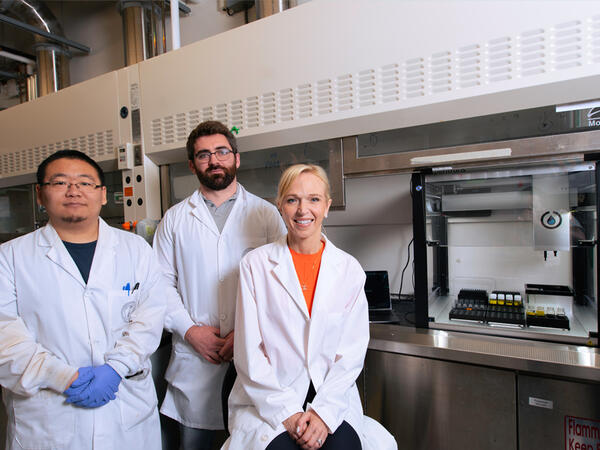
Christine
Allen
144 College Street
Toronto ON M5S 3M2
Canada
Area of Research
Christine Allen’s research focuses on developing advanced drug delivery formulations for the treatment of a wide range of indications including cancer and osteoarthritis. The research is broadly divided into several project areas including oncology (encompassing the identification of novel drug combinations for cancer therapy and the design of thermosensitive liposomes), the development of implantable drug carriers for sustained release, as well as determining the therapeutic potential for a range of formulated cannabinoid compounds for different indications. The Allen lab is committed to driving these technologies from bench to bedside in collaboration with several startup companies in the Toronto area and beyond.
Research Challenge
The research falls under three main categories:
Oncology: A major challenge with nanoparticle formulations of chemotherapeutic drugs is insufficient drug release at the tumour site, with some of the formulations approved for patients demonstrating minimal improvement in efficacy over standard of care. In addition, treatment of patients with single chemotherapy drugs can lead to resistance, making further treatment of these patients more difficult.
Sustained Drug Release: Long-term release (>one month) of drugs from a single non-invasive administration is highly desirable for patients with chronic indications (such as osteoarthritis and autoimmune disorders). However, long-term sustained release is difficult to achieve, with many delivery systems displaying a rapid, burst release profile.
Medical Cannabis: Medical cannabis is a rapidly evolving industry. However, there are significant gaps in the research of the medical application of cannabinoids. In addition, the inherent instability of cannabinoid isolates (such as CBD and THC) makes them challenging to administer to patients.
Proposed Solution
Oncology: The Allen lab designs novel formulations (termed thermosensitive liposomes) to enable site specific delivery of drugs to the tumour site. These formulations are capable of “triggered” drug release at the tumour site by heating them above body temperature. This ensures that the majority of the drug is maintained at the tumour site and minimizes potential off target effects. In addition, the Allen lab is working on identifying and formulating novel drug combinations that can offer an enhanced therapeutic effect in cancer and overcome or delay chemotherapy resistance.
Sustained Drug Release: Working with Pendant Biosciences Inc., the Allen lab is developing novel polymeric materials that can form microparticles and implants capable of long-term release of drugs for a wide variety of indications.
Medical Cannabis: Working with Avicanna Inc., the Allen lab is designing advanced formulations of cannabinoids that can simultaneously enhance their stability while improving their therapeutic effect.
Impact To Date
The Allen lab’s research has resulted in the formulation of several drug delivery technologies that enhance the effectiveness and reduce the toxicity of the chemotherapeutic agent encapsulated. They have developed thermosensitive liposome formulations of several drugs that improve the distribution of the drug within the tumour. Working with collaborators at UHN, these formulations are being paired with a clinically relevant heating system in order to make the technology more translatable.
In collaboration with Pendant Biosciences, the Allen lab has filed several patents for depot systems and microparticles formulated from novel polymeric materials for the sustained release of drugs. These formulations are currently under development for various clinical applications.
In addition, through collaboration with Avicanna and the Hospital for Sick Children, a topical formulation of cannabidiol (CBD) for the treatment of epidermolysis bullosa (EB) in children has been developed and is currently going through a Clinical Trial Application (CTA) with Health Canada.
Publications
Keywords: breast cancer, cannabis, cancer detection, cancer diagnosis, cancer treatment, cancer, nanotechnology, drug delivery, ovarian cancer, lung cancer, auger electron radiotherapy


